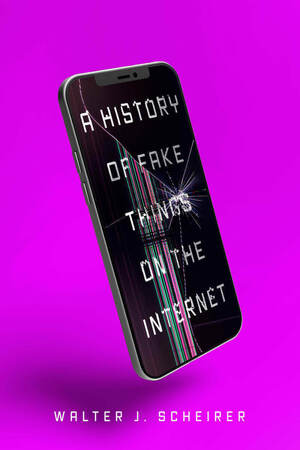Disinformation expert explores history and future of fake news in new book

The era of fake news feels brand-new.
But a new book, “A History of Fake Things on the Internet,” takes a deeper look into the origins of online deception.
“There’s this conventional narrative about fake news and manipulated imagery on the internet. But when I started to actually research this and looking into the history, it was very apparent to me that these are very long-standing issues,” said author Walter Scheirer, the Dennis O. Doughty Collegiate Associate Professor of Computer Science and Engineering at the University of Notre Dame.
The book takes readers on a journey that begins long before the internet existed, focusing on photo manipulation before diving into digital fakery of the ’80s and ’90s through today. Scheirer recognizes that the big fear people often have is that the perfect fake image or video could be created to fool the world into believing something wrong — he believes that’s unlikely.
“What I have found, which is more interesting and more concerning, is that obviously fake content is getting way more traction on the internet,” Scheirer said. “Things like memes often have a message that’s funny, right? But the message can still be dangerous.”
As an expert in image forensics, machine learning and AI, Scheirer conducts research at Notre Dame that focuses on combatting the rise of coordinated social media campaigns to incite violence, sow discord and threaten the integrity of democratic elections.
Often, these campaigns feature manipulated images exhibiting false claims and misrepresentation of incidents, fabricated news stories and memes, all created with the intent to provoke citizens and supporters of both political parties. The goal of his research with Tim Weninger, the Frank M. Freimann Associate Professor of Engineering, is to develop an early warning system that identifies manipulated images, deepfake videos and disinformation online.
“On the one hand, you have an enormous amount of fake material on the internet. Some of it appears to be threateningly bad. But it doesn’t seem like that’s stopping people from consuming it. In fact, people seem to be generating more and more of it,” Scheirer said.
But Scheirer’s book brings a different, more optimistic approach by questioning the surface level reading of the internet. He points to this idea that the whole world is creating fiction online and telling stories in their own distinct communities. It’s when that fiction reaches community outsiders that misunderstandings can occur.
In the future, he believes generative AI content is going to be the next frontier for leveling up creativity of the internet.
“It turns out the internet’s a really great creative engine. It’s the ultimate medium for storytelling,” Scheirer said. “I love the internet. And I think others can too if they learn to appreciate it as a really innovative, interesting place.”
“A History of Fake Things on the Internet” will be released by Stanford University Press on Dec. 5.
Contact: Brandi Wampler, associate director of media relations, 574-631-2632, brandiwampler@nd.edu
Originally published by at news.nd.edu on November 17, 2023.
Latest Research
- Brain tumor growth patterns may help inform patient care managementAssistant Professor Meenal Datta (University of Notre Dame/Wes Evard) A team of researchers from the University of Notre Dame, Harvard Medical School/Massachusetts General Hospital, and Boston University has developed a technique for measuring a brain tumor’s mechanical force and a new model to estimate how much brain tissue a patient has lost.
- Biseach Symposium Strengthens Cancer Research Partnership Between Notre Dame and University of Galway…
- Notre Dame announces new research collaborations with Ukrainian Catholic UniversitySeven faculty teams of collaborators from the University of Notre Dame (South Bend, Indiana, USA) and Ukrainian Catholic University (Lviv, Ukraine) have received grants from Notre Dame Global and Notre Dame Research to pursue…
- From reaction to resolution: The future of allergy treatmentTwelve-year-old Lauren Eglite was thrilled to attend a Notre Dame football game with her father, Erik, in 2017, even though her acute peanut allergy demands constant vigilance. She was even more excited when the stadium’s brand-new video board aired an NBC Fighting…
- New Study Highlights Mother-Child Link for Anemia in The GambiaAnemia is a "silent epidemic." It affects nearly 2 billion people globally, yet many people ignore its symptoms. Typically caused by the consumption of iron-deficient foods, anemia develops gradually. Its symptoms—such as fatigue, weakness, and shortness of breath—are frequently dismissed or misattributed.
- Megan McDermott joins ND–IBM Tech Ethics Lab as new Notre Dame directorThe Notre Dame–IBM Technology Ethics Lab, a critical component of the Institute for Ethics and the Common Good (ECG) and the Notre…












